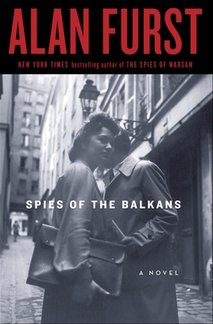
19 Aug 2010 04:20:22
"Spies of the Balkans" by Alan Furst
This story is startes with description of police officer Constantine Zannis, the string of odd occurrences adds up to big trouble for his city. German invasion seems inevitable, and that realization only steels his patriotic resolve.
Tough, resourceful and humane, Zannis fits the mold of other heroes in Alan Furst's 11 noir thrillers about Europeans in World War II. The newest tale focuses on a seven-month period when Zannis comes to grips with the Nazi threat and does his best to respond — a courageous but futile endeavor.
Called up for military duty when Mussolini's troops thrust into northern Greece, Zannis survives a rear-echelon bombing set up by fifth column plotters, then returns to his civilian job as the trusted fixer for Salonika's police chief.
Already he's made a fateful commitment. When a German Jewish woman with two children in tow appeals for help in reaching neutral Turkey, Zannis doesn't hesitate. He arranges to bribe Turkish diplomats to secure visas, then agrees to help the woman save other Jewish refugees fleeing the Gestapo.
Using his entree to Salonika's upper crust to tap into cash, and exploiting his contacts with underworld figures and police officials across the Balkans, Zannis sets up a railway conduit for Jewish refugees stretching from Budapest to the Turkish frontier.
Soon Zannis is drawn into a web of intrigue that leads to dangerous missions to France, Bulgaria and Yugoslavia to forestall a German invasion.
Along the way, the 40-year-old bachelor beds a British agent posing as a ballet teacher, a Grecian libertine and the beautiful neglected wife of a Salonika businessman. He also sets up a plan to evacuate his aging family from the threat.
The exploits are almost Bondian, except that Furst writes in a literary high style sprinkled with historical references and moody atmosphere. Who knew the real purpose of an Ottoman stool? Zannis demonstrates. Or how Siemens teletype machines became an instrument of Nazi foreign policy? The author explains.
"Spies of the Balkans" depicts compelling characters — both good and evil_ in the heightened circumstances of wartime, a drama based on real life in prose of cinematic clarity. It's another fine entertainment by author Furst with an enduring message of hope.
This story is startes with description of police officer Constantine Zannis, the string of odd occurrences adds up to big trouble for his city. German invasion seems inevitable, and that realization only steels his patriotic resolve.
Tough, resourceful and humane, Zannis fits the mold of other heroes in Alan Furst's 11 noir thrillers about Europeans in World War II. The newest tale focuses on a seven-month period when Zannis comes to grips with the Nazi threat and does his best to respond — a courageous but futile endeavor.
Called up for military duty when Mussolini's troops thrust into northern Greece, Zannis survives a rear-echelon bombing set up by fifth column plotters, then returns to his civilian job as the trusted fixer for Salonika's police chief.
Already he's made a fateful commitment. When a German Jewish woman with two children in tow appeals for help in reaching neutral Turkey, Zannis doesn't hesitate. He arranges to bribe Turkish diplomats to secure visas, then agrees to help the woman save other Jewish refugees fleeing the Gestapo.
Using his entree to Salonika's upper crust to tap into cash, and exploiting his contacts with underworld figures and police officials across the Balkans, Zannis sets up a railway conduit for Jewish refugees stretching from Budapest to the Turkish frontier.
Soon Zannis is drawn into a web of intrigue that leads to dangerous missions to France, Bulgaria and Yugoslavia to forestall a German invasion.
Along the way, the 40-year-old bachelor beds a British agent posing as a ballet teacher, a Grecian libertine and the beautiful neglected wife of a Salonika businessman. He also sets up a plan to evacuate his aging family from the threat.
The exploits are almost Bondian, except that Furst writes in a literary high style sprinkled with historical references and moody atmosphere. Who knew the real purpose of an Ottoman stool? Zannis demonstrates. Or how Siemens teletype machines became an instrument of Nazi foreign policy? The author explains.
"Spies of the Balkans" depicts compelling characters — both good and evil_ in the heightened circumstances of wartime, a drama based on real life in prose of cinematic clarity. It's another fine entertainment by author Furst with an enduring message of hope.

